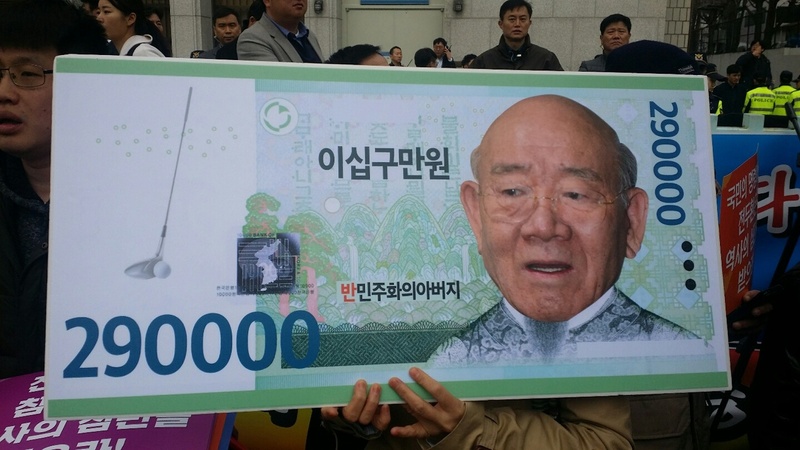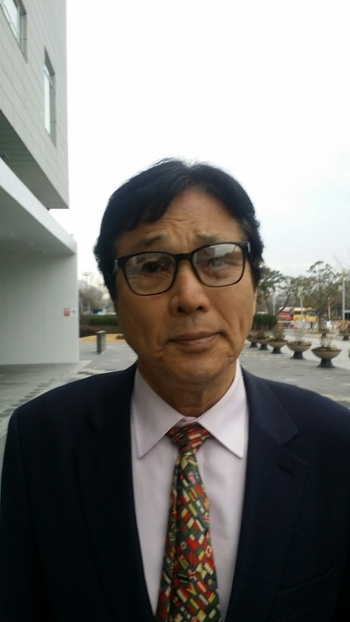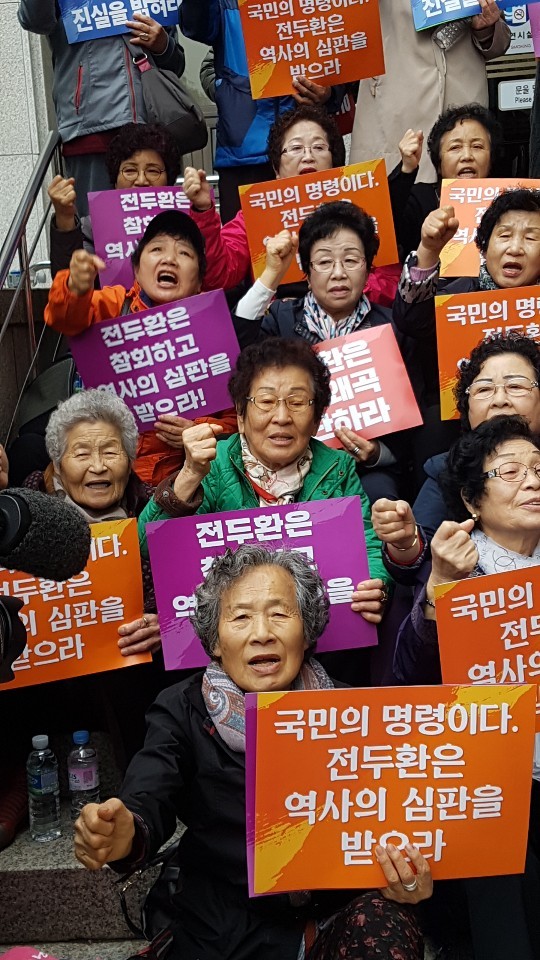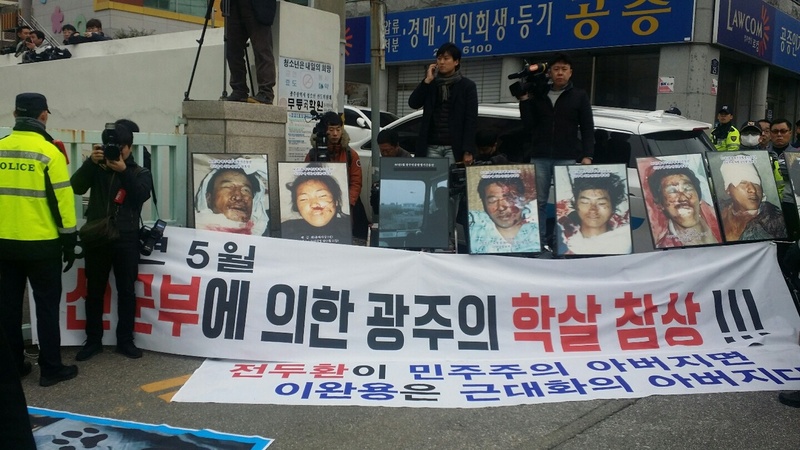Posted on : Mar.12,2019 17:15 KST
Modified on : Mar.12,2019 17:39 KST
 |
|
A satirical poster of ex-president Chun Doo-hwan, who is on trial for defamation of the deceased, in front of the Gwangju District Court on Mar. 11. The bill for 290,000 won is in reference to Chun’s claim that he only has only 290,000 won and cannot afford to pay any fines. (provided by Lee Ji-hyeon)
|
Ex-president acts defiantly and proudly in face of May 1980 victims
He felt his blood boil the moment he saw the face of the man responsible for the slaughter. Breathing deeply, he managed to quell his anger. As expected, he could see no sign of guilt from ex-president Chun Doo-hwan when he entered courtroom No. 201 at Gwangju District Court at 2:29 pm on Mar. 11. Chun wore glasses, his lips pressed tightly together. With him was his wife Lee Soon-ja, 80, who previously described Chun as a “father of democracy.”
 |
|
Lee Ji-hyeon, former chair of the Association of People Injured in the May 18 Popular Uprising
|
The erstwhile inaugural chair of the Association of People Injured in the May 18 Popular Uprising (Gwangju Democratization Movement), 65-year-old Lee Ji-hyeon felt a storm of emotions as he took his seat in the courtroom. He lost one eye during the events of May 1980 in Gwangju. Sporting an eye patch at a National Assembly hearing on Gwangju in 1988, he described being beaten by airborne troops. His battle to bring the truth of May 1980 to light in the incident’s wake led at one point to him being dragged to a security force basement and subjected to brutal torture. After being selected on Mar. 8 to attend Chun’s trial, he posted a message on Facebook under the title “He is coming.”
“It is difficult for me to face the pain again, but I will watch the trial with glaring eyes for the sake of uncovering the truth of May 18,” he wrote.
Tension rippled throughout the courtroom. After the summary of the prosecution’s charges was read out, Chun’s defense declared that while their client’s characterization of late the Catholic priest, Father Pius Cho Cheol-hyeon, as “a shameless liar” might constitute libel, it “does not meet the criteria for defamation of the deceased.” The claim was expected. Lee could see Chun leaning against his seat, inserting and removing his headphones while conversing with his wife. He wondered how someone could assume such an attitude in a Gwangju courtroom. The rage he had managed to smother at the murderer’s brazenness began welling up again.
Suddenly, a voice rang out from the gallery.
“May I address the court? The defense is lying,” someone cried. The person was immediately silenced by security personnel.
Chun and his wife kept their eyes fixed toward the judge. Lee suspected it was a sign of a guilty conscience and fear of facing the gaze of Gwangju residents. As the hearing finished, the judge announced, “Henceforth, this will be conducted as a concentrated trial.” The next hearing was set for 2 pm on Apr. 8. Chun and his wife exchanged whispered words with counsel; they appeared to be discussing the favorability of the trial date and procedure.
The hearing ended at 3:45 pm. In the courtroom, someone yelled out, “Chun Doo-hwan, you murderer, apologize before you leave!” The “murderer” blinked a few times before exiting the courtroom with his wife.
Chun’s arrival at Gwangju District Court was also watched from a distance by 58-year-old Kim Tae-chan, another member of the May 18 citizens’ army. In that instance, an image passed through Kim’s head: the scene of his friend fatally shot beside him on the last night of May 27, 1980. Then head of the special strike force’s seventh team, Kim was arrested that day on the second floor of the South Jeolla Provincial Office building and subjected to intense suffering.
“All I saw was his face. What words need be said? I just want to tear him apart. What kind of country protects murderers in this way?” His words were thick with bitterness.
 |
|
Members of the civic group The Mothers of May 1980 call for the conviction of Chun in front of the Gwangju District Court on Mar. 11. (Ahn Kwan-ok, Gwangju correspondent)
|
A mother sees the perpetrator of her son’s murder
After seeing on the news that Chun had left Seoul for his trial in Gwangju, Lee Geun-rye – an 82-year-old resident of Gwangju’s Wolsan neighborhood who has been referred to as the “mother of May 1980” – stood on the road in front of Gwangju District Court to await “his” arrival.
A grimace came over her face as she saw him hurry into the court building. Her son Gwon Ho-yeong, born in 1962, went missing on May 26, 1980, after briefly stopping at their house. In October 2001, his remains were found in a Mangwol graveyard where 11 anonymous victims lay buried. DNA testing on the family members of the missing resulted in his body finally being recovered 21 years after the incident.
“I’ve been sitting in protest in front of the National Assembly for over a month, but I came down to Gwangju to see his trial,” Lee said.
 |
|
A banner calling for the conviction of Chun in accompanied by photos of Gwangju Massacre victims in front of the Gwangju District Court on Mar. 11
|
Not a word of apology
At 4:15 pm, Chun exited the court building. He descended the staircase and got into his car, where his path was blocked by residents and members of May 1980-related groups. Cries of “murderer” echoed all around – but that was all. The protestors seemed to be holding back from any further action, lest their behavior provide fuel for further attempts to distort the facts of May 1980. After 16 minutes of being hemmed in by the crowd, Chun’s car finally headed toward the intersection outside the court. Lee Geun-rye, who had been standing there the whole time, sank to the ground and cried out, “Is he human? He comes all the way here, and not one word of apology. [. . .]”
By Jung Dae-ha and Ahn Kwan-ok, Gwangju correspondents
Please direct comments or questions to [english@hani.co.kr]












